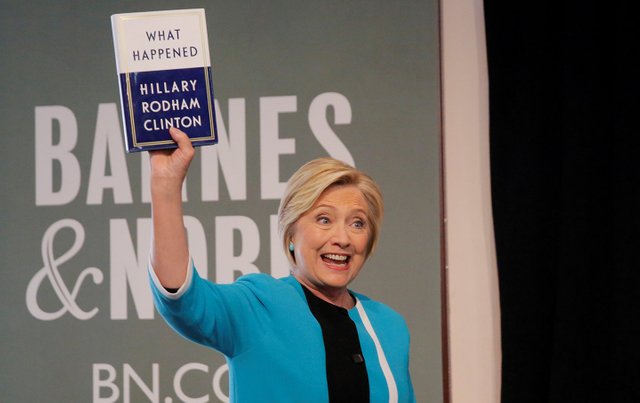What Happened? The Inevitable Failure of Electoral Politics
After the American presidential election of 2016, Hillary Rodham Clinton published What Happened?, her personal analysis of that election and the circumstances that lead to the election of President Donald Trump. Throughout the book, Clinton somehow avoids taking any personal responsibilities for her own failings while also entirely discrediting the movements that she took advantage of in her attempts to become the American head of state. Her attitude towards electoral politics as the only avenue for substantive change and the final testing ground for all legitimate movements typifies the lack of touch that is the hallmark of the failure of the Democratic Party in the United States. While there is no need for us to add to the considerable vitriol against her or her campaign at this time it is important to acknowledge the damage that her line of thinking does to progressive movements by dooming them to the inevitable failure that is the compromises of hierarchical political positions resulting from partisan electioneering.

Hillary Rodham Clinton showing her book What Happened? Courtesy of The Nation
Errico Malatesta writes in an article titled “Electoral Politics” (“Tattica elettorale”, L’Agitazione (Ancona) 1, no. 20 (July 30, 1987)) responding to a letter sent in by an anarchist who asks for support of a protest candidate:
“[O]nce the electoral contest is accepted, even with a thousand restrictions and provisos, not only does one of necessity end up reneging upon the anarchist program, but little by little there is a retreat from any concrete and definite program and a lapse into some vague democratism that is sterile in terms of ideas and importnet in terms of action… is the discussion that works fine for him and for us useless in the case of the masses who are deemed to be asleep and are driven to an even sounder sleep with lullabies about the helpful laws that Parliament will pass and the social justice wthat will emerge from the ballot-box?
On reflection, we reckon that our correspondent means that what matters right now is to resolve the freedom question, nay—lets come to the point—to make the republic, postponing a resolution of the social question until later. In that case, then, let him call himself a republican and let him debate with the republicans whether the protest candidate weapon suits their purposes.
We are anarchist socialists because we believe that the time, not merely for debate but also for trying to resolve all the problems in the life of society is already upon us, when there are men who sense the urgency of such matters, and because we hold that freedom, a pre-requisite for a solution that serves everyone, cannot be obtained without the abolition of private property and the abolition of public powers.”
Malatesta’s words highlight the malaise that accompanies the election which brought to a close 8 years of nothingness as a result of Democratic control of the executive under President Barrack Obama. During a time when the party establishment considered the activity of youth, minorities, and the progressive citizenry to be at historically high levels the administration miraculously provided substantial victories to the military-state, intelligence-industrial-complex (through warrantless wiretapping, kangaroo FISA courts, unprecedented nonjudicial drone killings including of an American citizen and his child, record-setting deportations, and accelerated privatization and commodification of personal information for corporate gain), and elite bourgeoisie while also providing nothing of value to the people of the movements that propelled such a meteoric rise. It is only a cruel joke that the biggest let-down of a presidency is followed by the most predictable disappointment of a presidency.

Courtesy of Steve Breen San Diego Union Tribune
It is often said in support of electoral politics and the accompanying bravado that the vote is the simplest and easiest choice in which the informed person can have the most lasting change on the world around them. To accept such a claim is to be a republican of the highest order and betray any possibility of the anarchism we espouse. Truly, every other action a person takes is more powerful than the vote, unless the goal of action is to remove power from the individual and cast it into the hands of the state and its heads, both seen and unseen.
The dangers of Hillary Clinton’s thinking would not be so worrisome if not for the fact that progressives gearing up for the next presidential election (still half a term or two full years away…) continue to fully espouse this line of thinking. Elizabeth Warren recently made her first trip to Iowa (the first state to pick its parties’ candidates for presidential elections and the “most important” state for federal electioneering) since announcing an exploratory campaign for President in 2020. In her speech she claimed that all she wants is for her people to “wait till 2020” to see what the Progressive have in store for the Republicans. The complete and utter vanity of such a claim is doomed to failure, if not in terms of her presidential run, in terms of the real movement towards a future that secures the abolition of power the end of the status quo. While it is likely that her early moves in this sphere are meant more to provide progressive pressure on the larger Democratic party establishment than an attempt to secure actual electoral victories for herself as a future President, progressives would do well to be weary of this type of shameless personal propaganda in favor of the promotion of the work we would actually like to see done.
Video of Senator Elizabeth Warren in Iowa, Courtesy of C-Span
It might be better said: “the most powerful thing you can do with the least amount of work is Don’t vote.